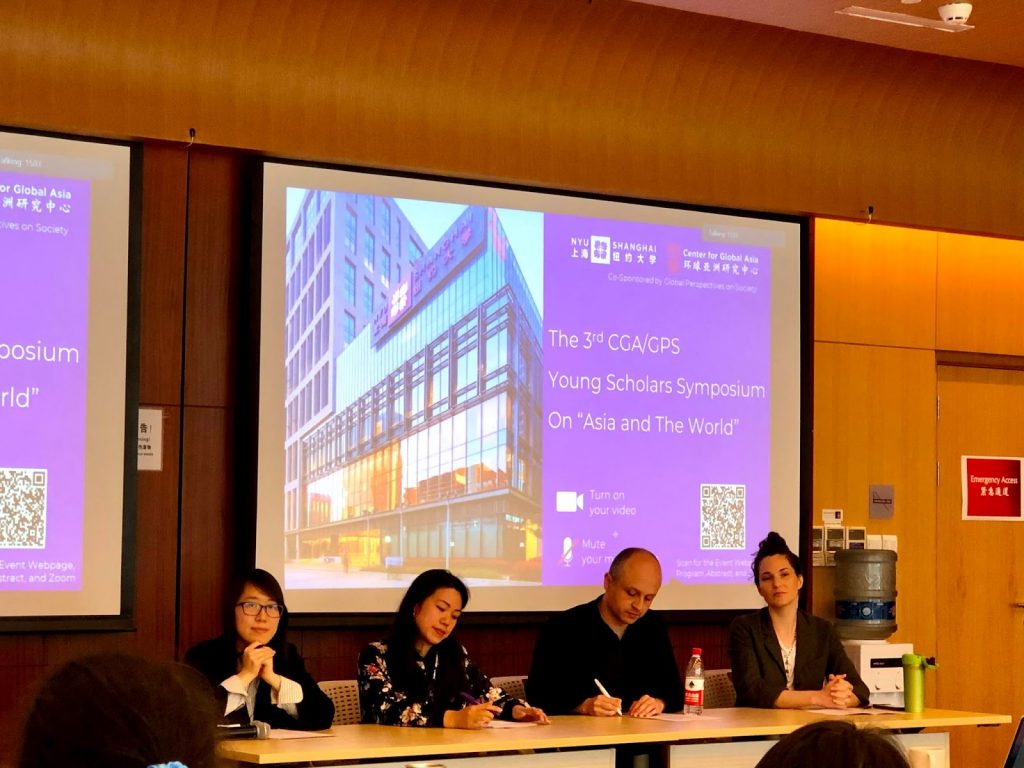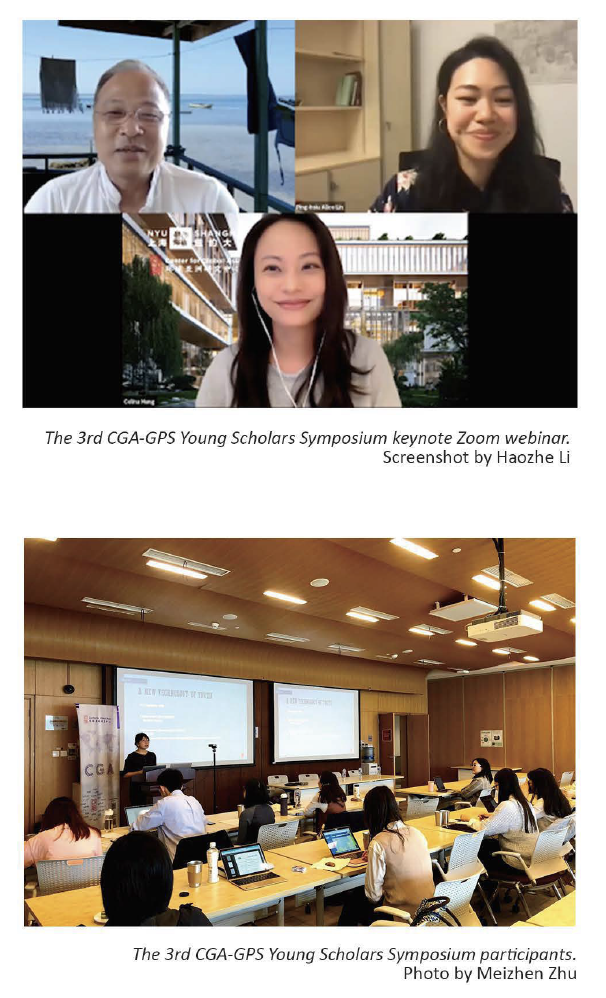CONTACT US
Email: shanghai.cga@nyu.edu
Phone Number: +86 (21) 20595043
WeChat: NYUShanghaiCGA
Address:
Room W822, 567 West Yangsi Road,
Pudong New Area, Shanghai, China

© 2024 All Rights Reserved

The 3rd CGA-GPS Young Scholars Symposium
Shujing Wang and Ping-hsiu Alice Lin
NYU Shanghai’s Center for Global Asia and the school’s academic program Global Perspectives of Society co-hosted the third Young Scholars’ Symposium on April 16-17, 2021. The Symposium saw the participation of young scholars from NYU Shanghai – primarily postdoctoral and doctoral fellows, as well as recent alumni – engaged in the study of pan-Asian and global connections. Through a total of six panels, the Symposium reexamined the interconnectivity between Asia and the world through multidisciplinary angles, bringing young scholars from different fields to introduce new materials, perspectives, and methods for reassessing current scholarly discourses. The Center’s faculty affiliates, Weixian Pan, Yifei Li, Duane Corpis, Joanna Waley-Cohen, Leksa Lee, and Lu Zhao, also joined us as panel chairs and moderators.
The first two panels focused on media and infrastructure. The panelists probed the interplay between institutions and individual narratives, as well as between imperial powers and the environment. Examining photographic illustrations of crimes in late 1940s Shanghai and portrait studios in 1930s Taiwan, the first two papers revealed the different readings of photos across publics and the role of government institutions in circulating and reproducing such images. The following three papers shifted the discussion to the regions of Bengal, Madras, and the Upper Yangtze River. These papers described colonial and imperial efforts to improve and design the infrastructures in the river or coastal environment with varying degrees of success.
The central themes of the third and fourth panels, imperial knowledge and state power, attended to the negotiations between the state or colonial empire and frontier regions: the British Empire and Hong Kong, the U.S. and Hawaii or Fiji, and Qing China and Manchuria or Guizhou. The five papers depicted the idealization and imagination of the frontier ports, as well as the contests, integration, and nation formation in the borderlands. They also captured the diverse experiences of colonial and imperial audiences, immigrants, sailors, cultivators, and local grassroots, demonstrating the diverging conceptions of place, event, and policies.
The last two panels of the Symposium explored the shifting nature of objects, texts, and other subject matters, particularly how they emerge or are obscured in processes of transformation. Speakers in the fifth panel investigated the trajectories of objects and substances in ritual practices, production, and application procedures in relation to their archaeological, economic, and techno-political contexts in different regions of Central Asia and Southeast Asia. The discussion of the sixth panel examined the disappearance of words, books, and narrations in translation, performance, bibliography, and intellectual history due to historical transformations, local adaptations, and the political culture in either India or China.
The keynote speaker for the Symposium, Engseng Ho, Professor of Anthropology and History at Duke University, gave a talk entitled “Between Shanghai and Rotterdam: The Global Logistics Challenge to Indian Ocean Port-Cities,” which echoed the conference theme of “Asia and the World” through a close examination of port cities located between China and Europe. How do port cities rise and fall in a changing world of horizontally integrated production and corporate profits? In this talk, Professor Ho showed how port cities in Asia develop and find new roles in a changing world, shaped by expansive global supply-chain networks and international trade. More than the historical dimension and location, what made certain port cities more successful than others was their ability to draw networks of trade to themselves through logistics and government that act as both state and commercial enterprises. Much like the presentations that preceded and succeeded Ho’s talk, a multidisciplinary approach is foregrounded in understanding the movement of commodities and peoples, and the development of infrastructure across port cities and elsewhere.
Most importantly, the presentations and discussions that took place during the 3rd Young Scholars’ Symposium highlighted the diversity and complexity of current scholarship on Asia. By extending research into Asia’s global connections beyond the frequently studied themes of migration, colonialism, and mercantile networks, the participants in the Symposium opened up questions regarding political ecology, labor, identity, knowledge transmission, and collective imaginaries. The interdisciplinary nature of their research joined a vibrant and important stage in Asian studies in the globalized world.

Email: shanghai.cga@nyu.edu
Phone Number: +86 (21) 20595043
WeChat: NYUShanghaiCGA
Address:
Room W822, 567 West Yangsi Road,
Pudong New Area, Shanghai, China

© 2024 All Rights Reserved